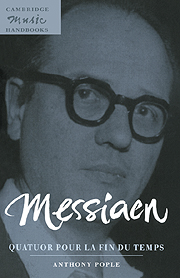Book contents
- Frontmatter
- Contents
- Acknowledgements
- Introduction
- 1 ‘Liturgie de cristal’
- 2 ‘Vocalise, pour l'Ange qui annonce la fin du Temps’
- 3 ‘Abîme des oiseaux’
- 4 ‘Intermède’
- 5 ‘Louange à l'Éternité de Jésus’
- 6 ‘Danse de la fureur, pour les sept trompettes’
- 7 ‘Fouillis d'arcs-en-ciel, pour l'Ange qui annonce la fin du temps’
- 8 ‘Louange à l'Immortalité de Jésus’
- 9 Contexts
- Appendix: Messiaen's modes à transpositions limitées
- Notes
- Select bibliography
- Index
9 - Contexts
Published online by Cambridge University Press: 05 June 2012
- Frontmatter
- Contents
- Acknowledgements
- Introduction
- 1 ‘Liturgie de cristal’
- 2 ‘Vocalise, pour l'Ange qui annonce la fin du Temps’
- 3 ‘Abîme des oiseaux’
- 4 ‘Intermède’
- 5 ‘Louange à l'Éternité de Jésus’
- 6 ‘Danse de la fureur, pour les sept trompettes’
- 7 ‘Fouillis d'arcs-en-ciel, pour l'Ange qui annonce la fin du temps’
- 8 ‘Louange à l'Immortalité de Jésus’
- 9 Contexts
- Appendix: Messiaen's modes à transpositions limitées
- Notes
- Select bibliography
- Index
Summary
The Quatuor pour la fin du Temps is among Messiaen's best known compositions, and has been recorded many times. Possibly out of respect for the extraordinary circumstances surrounding its composition, it seems to have been more or less immune to the harsh criticism that from time to time beset the composer and his works. Another protective factor may have been its unusual format: as a piece of chamber music it is not quite unique in Messiaen's output, but it remains the case that works for orchestra, piano, organ or voices comprise over five-sixths of what he wrote, and those who sought to make critical arguments for or against the composer's highly individual and characteristic style were perhaps unlikely to direct their attentions to a work that might have seemed peripheral by comparison with, say, the Turangalîla Symphony (1946–8) or the vast piano cycle Catalogue d'oiseaux (1956–8).
Public trajectories
In the period following the composition of the Quatuor and his repatriation to occupied France in the spring of 1941, Messiaen set about his work with remarkable vigour. Later the same year he took up an appointment at the Conservatoire as professor of harmony, and in the following year he set about writing Technique de mon langage musical. He also returned to composition, although the works he wrote initially were either brief or unfinished, namely the Chœurs pour une Jeanne d'Arc (1941, unaccompanied voices), the Musique de scène pour un Œdipe (1942, ondes Martenot), and the Rondeau (1943, piano).
- Type
- Chapter
- Information
- Messiaen: Quatuor pour la fin du temps , pp. 88 - 95Publisher: Cambridge University PressPrint publication year: 1998



